
As a freelancer, it is necessary for you to build your online presence in order to grow and maintain your business.
The best way you can do it is by promoting yourself as a personal brand in your niche.
Personal branding not only helps you in getting valuable clients, it plays a significant role in your career growth as well.
You can start building your personal brand even if you are an experienced freelancer or new to the freelancing domain.
Before talking more about personal branding for freelancers, let’s talk about the elephant in the room.
What Exactly is Personal Branding?
Personal branding is the process of promoting yourself with the intention of establishing credibility and authority in your industry.
Over time, you can position yourself as an expert or thought leader in your niche.
Personal brand is the impression others make when they think of you. It is a combination of public opinion, reputation, prior knowledge, interactions, experiences, personality, and more that is associated with your name.
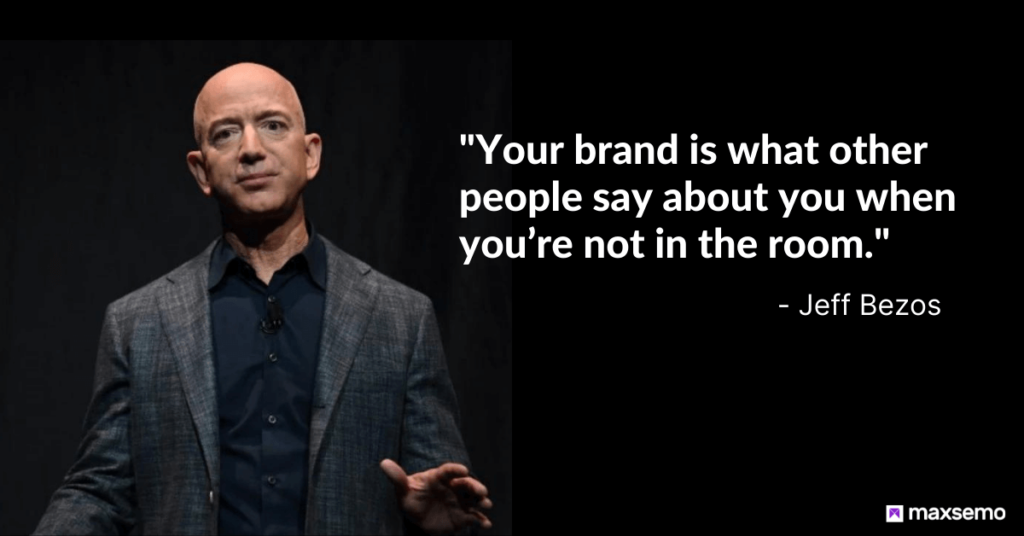
For example, when you hear the name Neil Patel you know that he’s a renowned expert in digital marketing or Jen Simmons who is well-known for her expertise in graphic design and web development.
If you are a tech enthusiast then you must be familiar with the tech reviewer Marques Brownlee popularly known as MKBHD in the YouTube space.
Also, you know how Elon Musk built his reputation by popularizing electric vehicles and reigniting people’s interest in space exploration.
There was a time when personal branding was only ‘reserved’ to athletes, business magnates, movie and TV celebrities.
With a smartphone and internet available at your fingertips, now anyone can build their own personal brand.
Why Freelancers Need Personal Branding?
We know that companies use brand awareness campaigns to attract their target audience and stand out from rest of the competition.
Same way, you can use personal branding to attract clients that suits well with your interest and expertise.
You can highlight your skills and proficiency through your personal brand so that you can easily get niche-specific client projects and consulting opportunities.
Be it personal or professional, we all want to stay in touch with like-minded people.
By displaying the personality side of your brand, people (professionals from your industry, business owners, recruiters, entrepreneurs, content creators/influencers, etc) will show interest in connecting with you.

Not everyone will become your client, but they can help you connect with your prospective clients.
This is how you can grow your professional network with the power of personal branding.
Your personal brand can help in building trust with your potential clients and secure projects from them even if you are new in the freelancing business.
Branding yourself and recognition as an expert can make you stand out from the crowd. This will in turn gives you competitive advantage when it comes to charging clients for your service.
Those clients will approach you who are willing to pay you your worth instead of going after low-paying projects.
Lastly, your personal brand can open door to new opportunities like:
- Full time job offers
- Consulting
- Coaching
- Mentorship
- Becoming a social media influencer
- Starting a company, and more.
Thus, it’s worth your time and effort in building your personal brand.
Now you know how personal branding works for freelancers. Let’s see how you can build your personal brand in your freelancing niche.
12 Personal Branding Tips for Freelancers
1. Leverage Linkedin to Your Advantage
Linkedin is the best social media platform for building personal branding for freelancers, since the platform is catered for professionals.
Unlike other social media platforms, you can fill in a detailed description of your work experience, add your best projects, certifications if any, and add a great bio in the ‘About’ section of your Linkedin profile.
Add your contact details, your personal website, get skill endorsements, and recommendations from your previous clients.
Make sure to optimize your name, profile photo, your current role, location, profile URL, and banner image so that your profile will get a ‘great’ first impression from visitors.
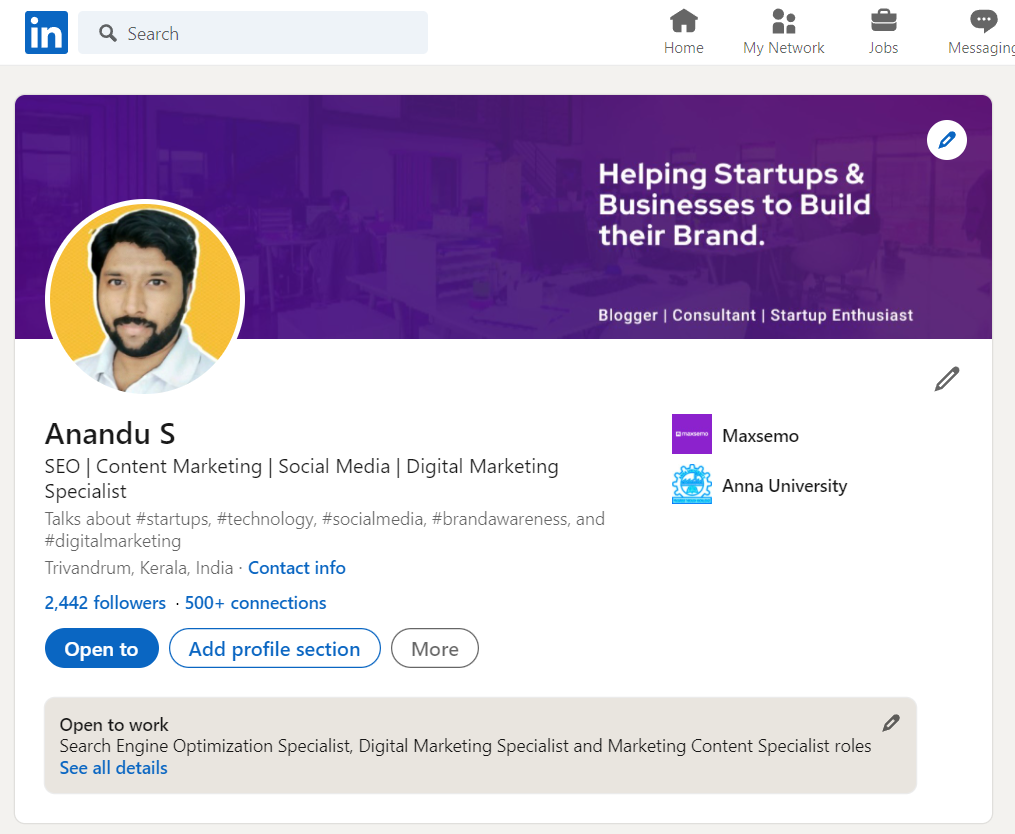
Also, try to include your niche skills as keywords in your profile headline so that your profile will start appearing on Linkedin search results. This in turn increases the chances of getting more profile views.
With 774+ million registered users worldwide, Linkedin provides you with the opportunity to connect with people from diverse business and professional backgrounds.
Instead of sending promotional messages to your prospective clients on Linkedin, you can attract their attention through content creation.
Create and publish niche-specific content in the form of carousels, short videos, single image posts, polls, and long-form text posts.
Make sure that you respond to comments that appear under your Linkedin posts and this way you can increase the organic reach and engagement of your posts.
Engage with (niche-related) posts shared by other people in your network by leaving thoughtful comments.
This way, your Linkedin profile get more views and high engagement for your posts.
This in turn increases your ‘visibility’ on the platform and people (also through referrals) will start approaching you for advice, consultations, and freelance work opportunities.
2. Personal Website to Boost Your Online Presence
Having your own website is essential in order to boost your online brand presence as a freelancer.
Also, it is good to have your own digital platform apart from owning social media accounts.
For creating your personal website, I suggest that you purchase a domain name that is same as your name.
For example, Aleyda Solis who is a well-known SEO consultant owns a personal website where you can find her blogs, newsletter, upcoming speaking events, free tools, and SEO learning resources.
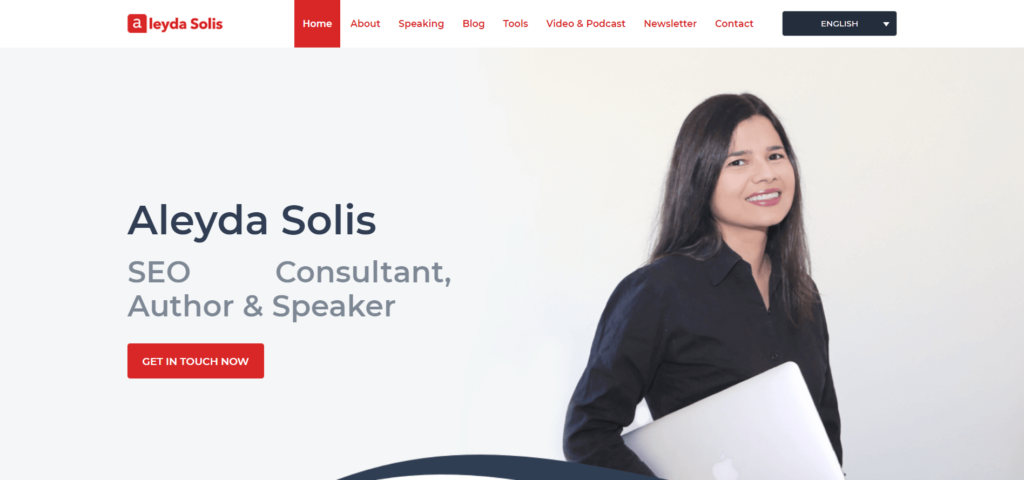
You can use popular website builders like Bluehost, Namecheap, Inmotion Hosting, Pixpa, Wix, Hostinger, and Squarespace to create your website. You don’t require coding skills to use anyone of these tools.
You can showcase your work, career history, client testimonials, news article mentions (if any), and little about yourself on your website.
If you possess some writing skills, you can do active blogging on your website that will increases your reputation as a trustworthy and reliable expert in your niche.
Through blogging and website optimization, you can increase your search presence on Google and other search engines.
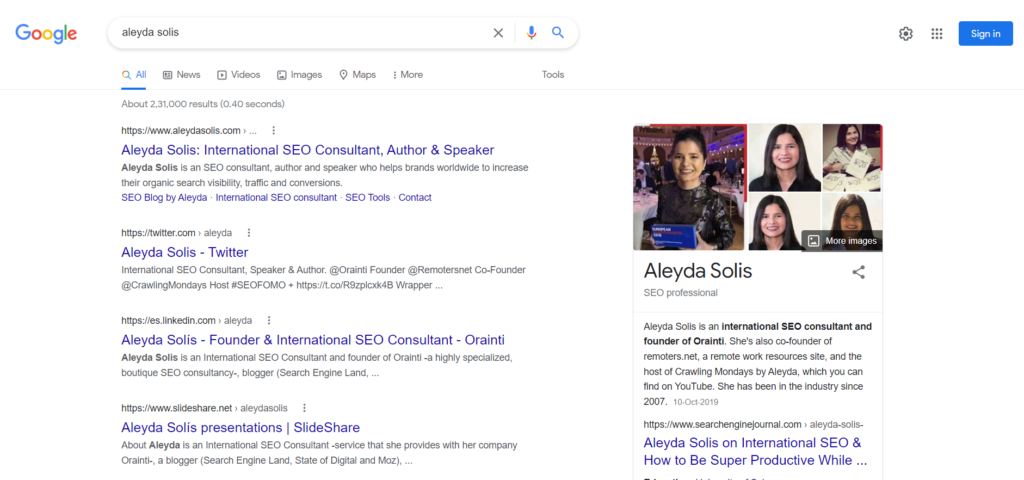
You can even showcase your own website as a ‘work portfolio’ to prospective clients if you are working in the SEO, content writing, affiliate marketing, web designing, or web development domain.
Another great advantage having your own website is that monetize it through blogging to create a source of recurring revenue.
This is a tried and tested tactic when it comes to building personal branding for freelancers.
3. Use of Professional Email Address
Email is still one of the preferred platforms for businesses when it comes to communication and marketing purposes.
This is applicable for freelancers also.
You need to use a professional email address rather than using the generic Gmail, Outlook, and Ymail addresses.
If you have own personal website then you can use email address that is same as your domain name.
When you communicate with your clients via your professional email address, it increases your reputation among them.
4. Start an Email Newsletter
Starting an email newsletter is a great way to connect with your target audience, establish authority in your niche, and build a loyal following.
You can use email newsletter to send industry updates, tips, case studies (of your completed client projects), surveys, reviews of products/services/apps you use, etc.
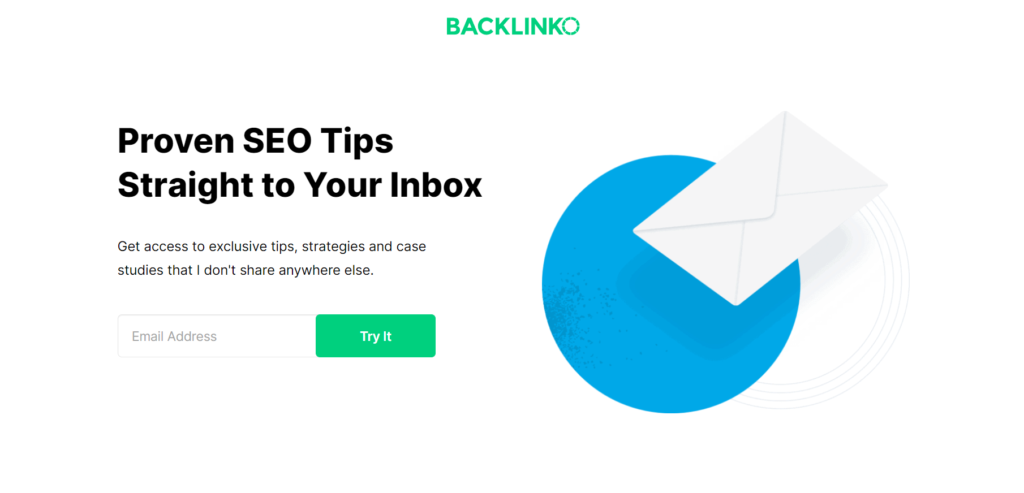
Also, you can repurpose content from your website blogs to create email newsletters.
Nowadays, it is easy to create a newsletter with all necessary tools available on the web.
You can use popular email automation platforms like MailChimp, MailerLite, and SendinBlue to create your own newsletter.
If you don’t have a website blog, you can use publishing platforms like Medium and Substack for starting your newsletter.
Even social media platforms like Linkedin and Twitter have rolled out their own newsletter service for their respective users. You can look into that also.
Encourage your followers, colleagues, and others (interested in your content) to subscribe to your newsletter through social media and your website.
5. Expand Your Social Media Presence
As you know by now Linkedin is the best platform for building personal branding for freelancers.
Linkedin is certainly a social networking platform but more suited to professionals, executives, and those who are business-savvy.
Not everyone in your target audience (including potential clients) are active on Linkedin.
Also, no one really knows for how long Linkedin will stay relevant (remember Clubhouse?) and not get banned (like TikTok in few countries).
So, it is better to expand your social media presence beyond Linkedin to another platform like Instagram, Twitter, or Facebook.
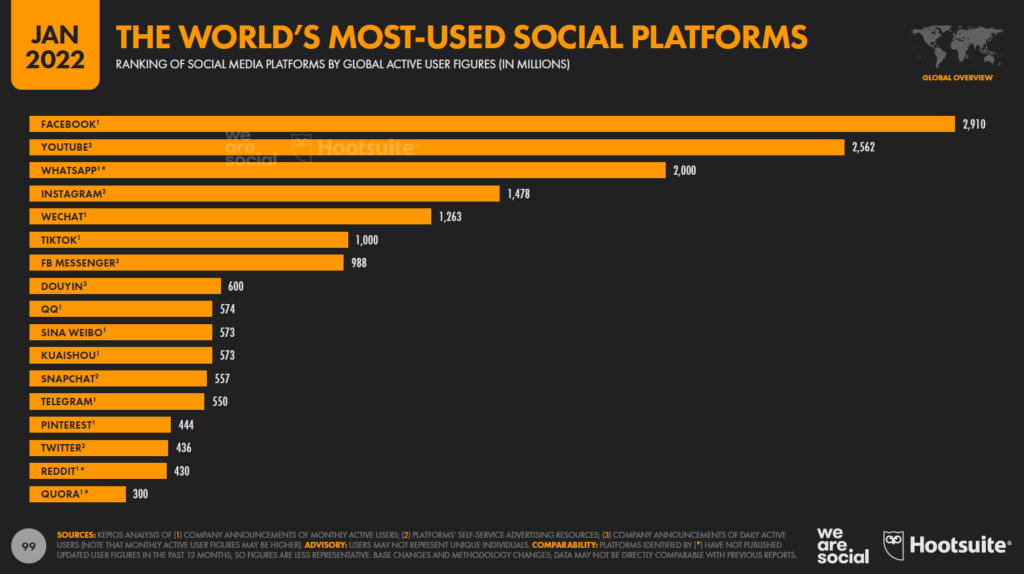
according to Hootsuite 2022 survey report
If you love to record yourself on camera, you can look into Youtube, Instagram Reels and other short-video platforms.
Video content gets more engagement compared to other formats. That’s why TikTok has now become a serious competition to Facebook.
To create visual content (images, videos, gifs, etc) for your social media channels, you can consider these awesome tools – Animoto, InVideo, Renderforest, Biteable, and Canva.
6. Conduct Live Video Sessions
Nowadays, most social media platforms (whether it be on Linkedin, Instagram, and YouTube) have live video streaming feature.
It is the perfect opportunity for a freelancer to showcase their niche skills and knowledge in real time.
You can conduct various live sessions that include:
- Frequently asked questions
- Ask me anything
- Interview an industry expert.
- Talk about latest news, events, and trends in your industry.
- Updates or announcements regarding your freelancing business.
You can do live streaming simultaneously on multiple social media platforms.
For example, if you are doing a live stream on your Youtube channel you can show the same stream on your Instagram and Linkedin accounts as well.
This helps you reach to a wider audience at the same time.
You can use video streaming tools like Restream, Switchboard Live, StreamYard, and OBS Studio to ‘multistream’ your live video.
You can repurpose the recordings of your live video to create new content for your next Linkedin or Instagram post.
7. Podcasts
Podcast as a digital medium has been on the rise for the past few years.
Podcasts are much more personal compared to social media posts since your audience can listen to your voice.

This medium enables you to showcase your expertise and niche knowledge to an interested audience.
You can start your own podcast channel on popular platforms like Spotify, Apple Podcasts, Google Podcasts, and SoundCloud.
There are tools like Alitu, Anchor.fm, Audacity, Logic Pro, and Podcastle that can help you create and publish podcasts.
Try to get featured or interviewed on other freelancer’s podcasts in your niche. It can get your name out there and boost your freelancing business.
8. Start Your Own Online Community Group
Another way of growing your personal brand reputation is by starting your own niche-based, online community group.
You can create an online community group and invite your colleagues and people who are interested in topics you want to discuss.
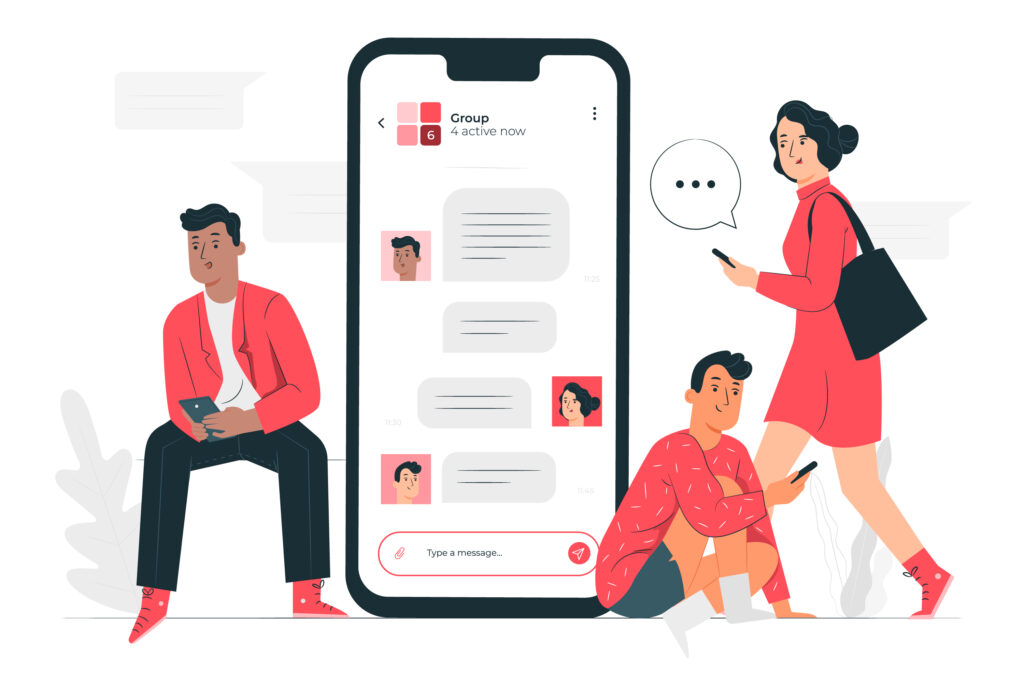
You don’t want to promote your blog posts, social media posts and your services constantly but do share relevant articles that will help members to solve their problems.
Make your community group a place where members can share and interact with each other comfortably. Also, make it exclusive.
In time, you can build a loyal and highly-engaging audience who will amplify you as a brand.
You can create your group on Facebook, Linkedin and Twitter. Or, you can use popular messaging platforms like Discord, Telegram, and WhatsApp for the same.
Check out this article if you want to build local business presence using WhatsApp.
If you want to reap the benefits out of online communities then keep in mind that active groups require investments of time and energy.
9. Collaborate with Influencers in Your Niche
To maximize your personal brand reach, you can collaborate with influencers in your niche.
These influencers can be bloggers, social media content creators, entrepreneurs, and other freelancers who established themselves as a personal brand in their respective niche.
Also, these influencers create highly-engaging content for their followers and regularly interact with their audience.
Find and follow niche influencers on Linkedin and other social media platforms, engage with their content, and try to build a personal connection with them.
Approach those influencers who are willing for a collaboration via email or DM.
For example, you can collaborate with an influential blogger to publish guest posts, case studies, industry trends, and survey reports on your website.
You can collaborate with an influencer to create content and share it on respective social media feeds.
Instagram has already come up with a similar feature that allows one account to invite another account to collaborate on an Instagram feed post or an Instagram Reel.
Hope other social media platforms will come with ‘collab’ feature in the near future.
Doing a live interview with an influencer is another form of collaboration.
When it comes to collaborations, you can approach nano-influencers as they easily approachable, highly niche-specific, and possess highly-engaging followers.
10. Client Testimonials
Client testimonials can help in boosting your reputation as one of the most-sought specialists in your niche.
You can display client testimonials on your website and if your clients provide you with video-based testimonials you can share them on your social media pages.

Also, you can request your clients to give you a Linkedin recommendation.
There will be some clients who are active and ‘influential’ on Linkedin and you can give your recommendation to them.
In return you may gets more exposure from their respective Linkedin profile.
If you are starting out as a freelancer, make sure that you gather testimonials after completing each client project successfully.
They can help you in building your personal brand in the long run.
11. Ask for Referrals from Your (Past) Clients
You can request your (past) clients who are satisfied with your work to bring referrals or spread word-of-mouth about your freelancing business.
12. Participate in Offline Industry Events
With the pandemic residing, people are eager to network and socialize in the same old face-to-face way.
Participate in conferences, meetups, and other networking events happening in your industry.
You can meet new people, some of them will become your valuable connections, and some of them will become your potential clients.
If you make regular presence in these offline events, in time you will get the chance to become a speaker at the same events.
This is one of the best ways freelancers can enhance their presence both online and offline.
13. Help Others
You can make a genuine effort in helping others in the freelancing space.
For example, people who are starting out as a freelancer will have doubts regarding proposal creation, pricing, client communication, and many other things.
You can help them in clearing out these doubts, give them essential tips, and act as a ‘mentor’ for them.

You can even refer them to those clients who are looking for freelancers with specific skills, experience, and budget requirements.
You can also help them to build their personal brand in their respective niche.
Final Thoughts
I hope these personal branding tips will help you as a freelancer in building your reputation in your niche.
You can start applying these tactics and in time you will find those tactics that are working in your favour.
You can then modify these tactics based your needs and with the expectation of giving great results.
Do you have any personal branding tips for freelancers to share or opinions about my article? Let’s have a thoughtful conversation in the comments section. 😊

Good guide Anandu. Keep up the great blogging work.
Ryan
Thank you, Ryan